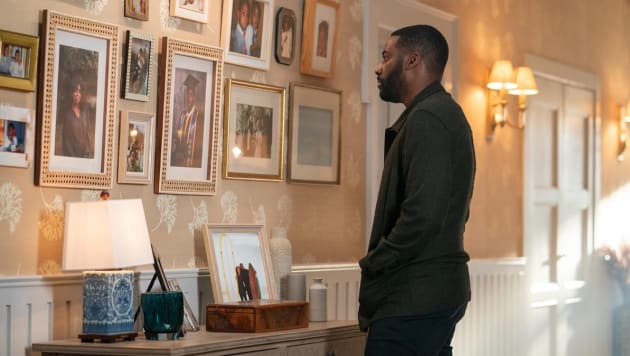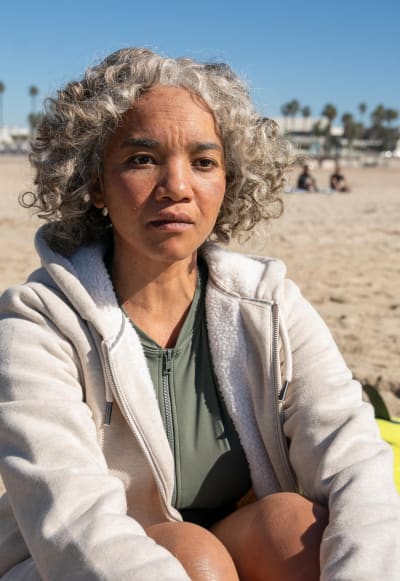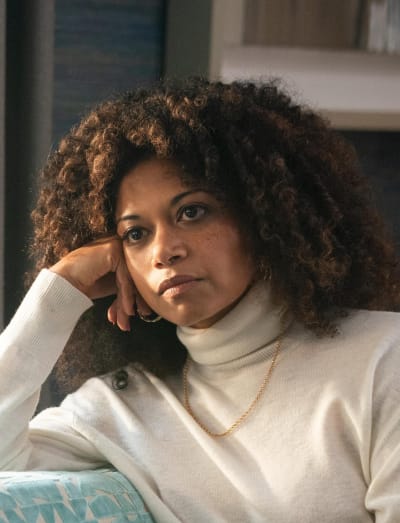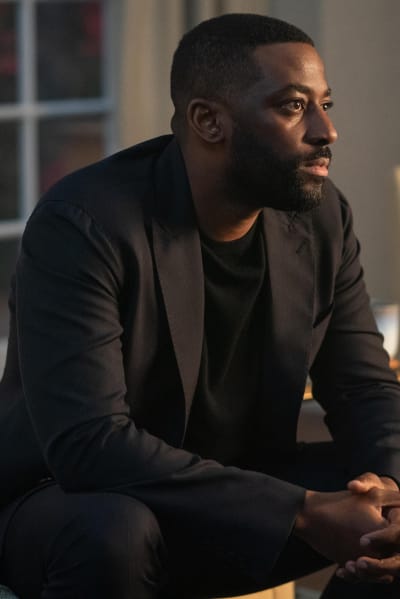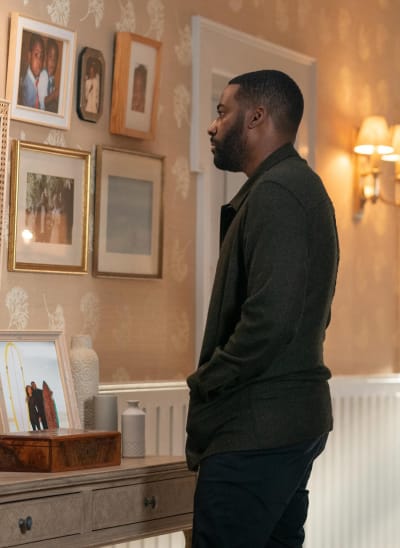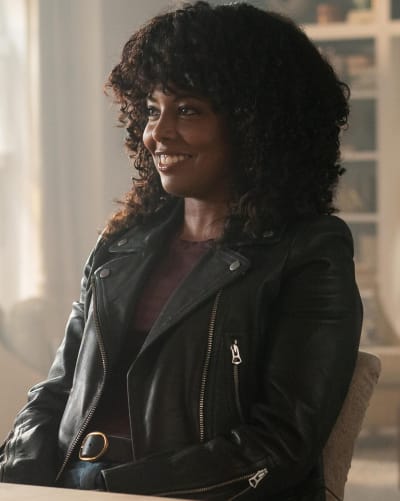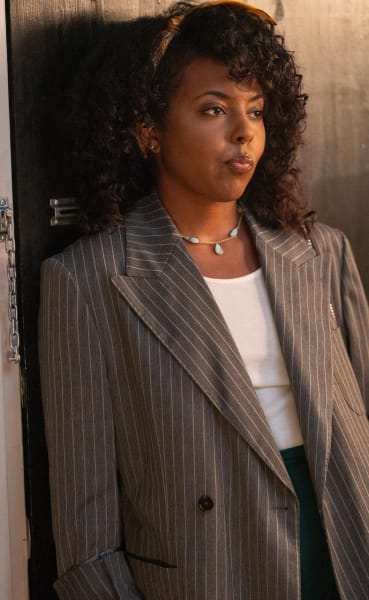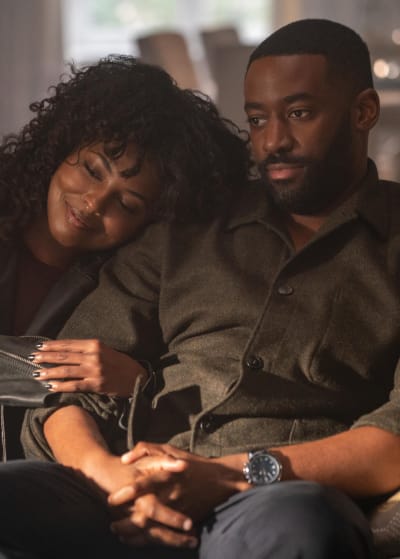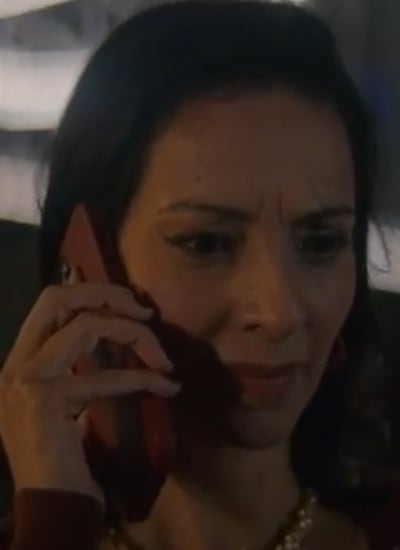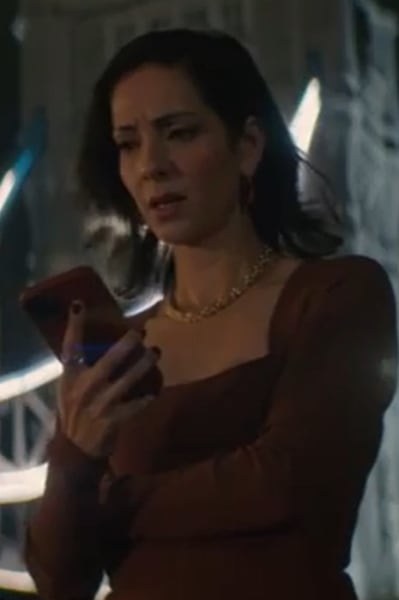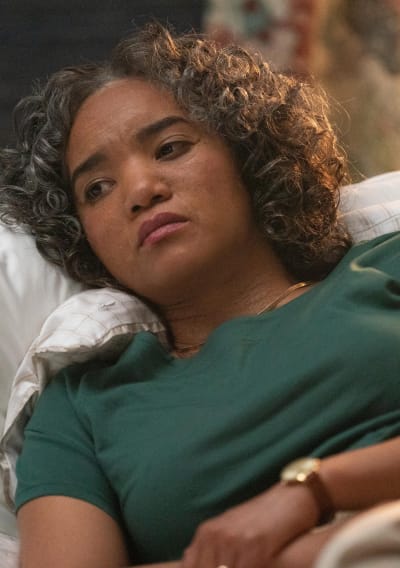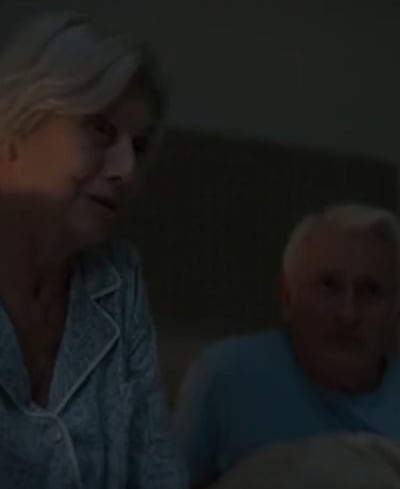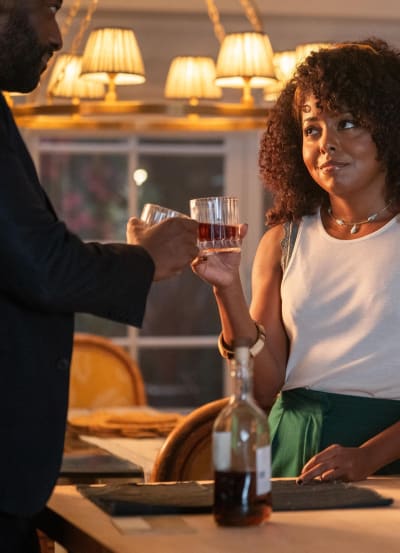The Bennett siblings are doing incredibly well, given all the revelations they’re bombarded with at once.
Eleanor Covey Bennett has LIVED, and she died with more secrets than any government agency around the globe!
And yet the people she left behind were still unprepared for the whopper of a secret revealed during Black Cake Season 1 Episode 5.
Oh, bless this series’ heart; it has everything except the kitchen sink. Scratch that; it has plenty of those, too.
The family melodrama runs strong during this series, with enough plot twists to rival a soap opera.
At the risk of sounding redundant, this series is at its best when it focuses more exclusively on Covey or Eleanor.
Chipo Chung has a quiet way of carrying the series in the more current storylines, as Mia Isaac managed to do so phenomenally in the past.
It sucks to say it, but Benny and Byron just aren’t that compelling. And thus, when we’re obliged to spend much time with them, it feels like the series stalls.
As characters, they generally are the weakest of the bunch, feeling underbaked despite their prominence, which remains unfortunate.
It’s especially highlighted in this particular installment when another faction of the series opens up with a new character who feels rich, complex, and engaging in a single installment in comparison.
The beauty of Black Cake is what it strives to do as far as telling Black stories. And that’s not something you can take away from the series.
I tried to forget, B & B, lord knows I tried, but somewhere out there is the little girl who made me a mother, and how could I forget about that? The ache that the firstborn child had left in my heart grew bigger while my world grew smaller and lonelier. You asked me before, Byron, about that day on the beach, and you were right; it wasn’t an accident.
Eleanor
There’s a credit to be given and an appreciation for its intent because these diverse stories are worth telling in abundance like everything else.
But there are so many elements to Black Cake that feel as if they’re trying to tell the same stereotypical Black story, and that has a way of wearing the viewer down, well, some of us anyway.
It’s as if these stories can only and exclusively be steeped in trauma, and the execution of some of these plot points feels like they’re simply checking off boxes of these issues without much nuance or depth.
The end of the hour was rough for so many reasons. It’s triggering to constantly see images of Black men having worrisome encounters with law enforcement.
How we got to that point was so maddening, and it felt as if they took the little bit of character development we had for Byron Bennett and tossed it out the window for the sake of the plot.
Yes, there’s an argument to be made that after a tough day and a challenging conversation with Lynette about how he went from a man who used to affirm himself to someone who was “weak,” for lack of a more sensitive term, he could feel compelled to stop being passive in his life.
However, for drama and plot, he went to the most extreme by physically pummeling the hell out of Benny’s ex-boyfriend outside in front of multiple witnesses.
The call was for Byron to be more assertive, stick up for himself, fight for what’s right, and stop being such a shrinking violet who falls victim to “respectability politics.”
Black Cake’s answer, however, was to take this generally soft-spoken, seemingly passive, intellectual, thoughtful, and even-tempered person and evoke the “angry, violent Black Man” trope.
And for what? Was it to give an obligatory nod at Black men’s wrought relationship with law enforcement?
If so, it wasn’t necessary and felt shoehorned into the story for drama, unsuitable for the character. Also, what were they attempting to say by producing an incident that was devoid of systemic racism in the first place?
There wasn’t precisely implicit bias to be found when we saw Byron violently attacking a man who hadn’t actually done anything that legally would have instigated the outburst at that moment.
Related: Black Cake Season 1 Episode 4 Review: Mrs. Bennett
If anything, the scene was frustrating because Byron is perceived as far too level-headed to have willingly put himself in such a potentially dangerous situation in the first place.
Not only was it jarring that he’d suddenly go ballistic on a white guy in front of witnesses and barely stop when the cops arrived, but it’s hard to believe that someone who speaks so much about image, setting examples, and feels the weight of having the exemplary reputation, would risk doing anything like that in public where bystanders can make him go viral and cost him his job.
Compared to Benny and what she has going on, we rarely get much of Byron and his storyline, so it’s disappointing that this is something worked into it.
And even that had to do with Benny.
Lynette is an interesting enough character brimming with potential, but she’s underutilized. It doesn’t feel like the series has earned our investment in their relationship, either.
Lynette is the balance that Byron seemingly needs in his life, but this is such a basic observation to make about two characters who get lost in the plot.
Meanwhile, Benny takes up more space in this narrative, but it’s still difficult to care about her.
It pains me to say that having complex, messy, imperfect women onscreen is important. It’s taken a long time to get that and have those women become the heroes or protagonists of narratives.
I love you, but it’s not enough. I want to respect you, too.
Lynette
But where we have that and more in Covey/Eleanor, it’s utterly lacking with Benny.
She’s inarguably the most frustrating of the major players. She’s so self-absorbed it’s grating.
Since Black Cake Season 1 Episode 1, it has been astounding how she manages to twist everything that happens and make it about her.
We got this huge revelation about Eleanor having a first-born daughter out there — an unknown older sister the Bennett siblings had no idea about, and there was barely any space for Byron to react to any of it.
Benny barely let the dust settle from that jaw-dropping revelation before twisting the situation and making it about her and her strained relationship with her mother, which was primarily her own doing.
Byron shouldn’t have had to forego his feelings about the matter to spend more time reassuring his sister that their mother cared about and loved her.
It didn’t take a rocket scientist to conclude that this missing sibling was likely a result of that assault.
Instead of even considering whatever headspace their mother may have been in to give up a piece of her and the conflicted feelings she may have had about having any remnants of assault after the fact, Benny spent a significant amount of time whining about how her mother likely spent her time comparing Benny to the idea of who this other daughter could have been.
Benny: I always thought that I was living in your shadow, but it wasn’t about that. She was comparing me to her.
Byron: How could she compare you with this other person who wasn’t even in her life?
Benny: She was comparing me to a fantasy of her, which is even worse.
We started the installment with Benny making all of this about herself. We ended it with her impulsive moment of reckoning that was likely meant to be empowering but instead endangered her life and that of her brother.
Ugh, Benny Bennett is such a brat. Even her supposed standing up for herself to Steve was agitating because she spent a significant amount of time still not taking accountability for her own actions.
While there’s an appreciation for the series showcasing that violence against women is abhorrent and shouldn’t be steeped in things like whether or not the survivor is likable enough, I can’t even say there was an intention on the series capturing that.
Between the stunt with Steve that led to her brother’s out-of-character actions, law enforcement involvement, and the response to Mabel, Benny was such a nuisance.
You don’t own me or my body or my art or my talent, but you got in my head and convinced me that you did. You convinced me that I was weak for loving my family, and now, my mother is dead, and I will never get to say the things that I should’ve said to her, and I will never get to ask her the questions that I should’ve asked her because you robbed me of that chance you manipulative lying piece of shit, but not anymore because I’m done.
Benny
She didn’t want to acknowledge Mable anytime soon because it would make things too real. When, in all honesty, it was probably the thought that there would be someone who has their own complicated feelings and pain resulting from all of this, who could overshadow Benny’s petty griping.
Mabel Martin was a breath of fresh air.
Her introduction and story were a refreshing change of pace for the plot and managed to come close to the more fascinating components we saw with Covey.
It’s because, despite being a woman in her late 30s to 40s, we saw a similar identity path and tried to make sense of it.
Her introduction is fascinating and all too realistic as she was challenged by a peer over her statements regarding food, its origins, and the place she had in the conversation as a seeming white woman who appeared to be speaking on behalf of cultures she wasn’t within.
While you could understand what Mabel was getting at during her conversation, it was also obvious why the other woman pushed back on what she had to say.
Naturally, in this day and age, as most conversations do, it led to Mabel going viral and sparked social media discourse.
I loved how her parents were so comforting and supportive, while Gio, in true Gen-Z fashion, was brutally honest with his mother and co-signed the criticism.
Mrs. Martin: Mabel, it never mattered to us where you were from. We had waited for a child for so long.
Mabel: But you know who I was, what I am.
It seems Mabel has lived an incredibly privileged life, and unintentionally on her part, has lived her life as a multiracial woman who passes.
Mabel’s storyline feels more grounded than the Bennett siblings, which is surprising. We get an idea of who she was before she got that faithful phone call from Charles, then how everything clicks into place or undoes things after she learns the truth.
Connecting with this new character and even drawing parallels between her and Covey Lincook was easy.
Mabel’s career is fascinating and shows how fate works in mysterious ways. Who would’ve imagined that a multiracial woman who didn’t know about her origins would be immersed in the same cultures she thought she was outside of and drawn to the cuisine?
It’s always a hit when the series circles back to how food spans generations and ties together families, heritage, and culture.
Mabel speaking about her love of spices and how the British cuisine her peers went crazy for never sparked anything in her with her American date was amusing.
Speaking of amusing, Rupert Evans, the Brit, playing an American that other Brits poke fun at is wild, but this series almost gets a kick out of playing mix and match with actors and accents.
It was heartbreaking when Mabel learned about Eleanor’s history and that her parents had lied to her in a single conversation.
It was also puzzling that Charles hadn’t shown much restraint when diving into this news as if she should’ve known. It’s a hell of a thing to drop all these bombs on someone and then simply hang up the phone afterward.
Mabel was reeling, but following as everything she knew about her life changed within moments was some of the strongest aspects of the season.
Her ability to calmly discuss things with her parents as she needled at them for the truth was great, and then you could tell when things hit as she had to get her point across to her mother, specifically about what they had done to her.
They spent her entire life lying to her, not only about her adoption but her entire identity, and hadn’t even considered how damaging it was.
Mabel: I got a phone call this evening from a solicitor in California. He said the strangest thing. He told me my birth mother had died. So, is it true?
Mr. Martin: Mabel, please. Must we really do this now?
Mabel: Yes, we must.
She spent her life under the impression that her darker skin tone, hair, and features resulted from a Sicilian relative.
The Martins assumed that they’d give their daughter the best life and that they didn’t want her to be treated differently, but that’s not something they could’ve ever controlled in the first place, and it’s so damaging to rob someone of their identity in such a significant way.
For one, they would’ve operated under the assumption that Mabel spent her life not once feeling different or as if something was missing.
More often than not, many non-white people can pinpoint when someone is multiracial or something. I wouldn’t be surprised if there were many times in Mabel’s life when her appearance was questioned in some capacity. Still, she had the Sicilian grandmother card in her pocket to unknowingly deter anyone from pushing a bit further.
Related: Black Cake Series Premiere Review: Mia Isaac’s Compelling Performance Elevates Drama
Mabel’s moment of looking at herself in the mirror through new eyes, paralleling her earlier scene of primping in the mirror without thought, was great.
The moment of finally looking Eleanor up on her own and seeing that it was a multiracial woman looking back at her was another great scene, as the shock of it all visibly rocked her along with her curiosity.
Mabel gravitating to other cultures as she did throughout her life suddenly made sense to her, and all these little things about herself added up, which made her parents not telling her the truth feel like such a betrayal.
Sadly, it also probably felt deeply albeit unintentionally racist.
The Martins simply never considered how problematic it was to adopt a multiracial child and treat her as if she was anything but that.
It’s pure ignorance on their part not to consider how harmful that is in the long run, especially when Mabel finds out the truth. It’s damaging not to have that connection.
They came across as the color-blind parents who failed to comprehend that in NOT seeing color, you’re not seeing someone at all — or that the implication is that there’s something wrong with simply acknowledging the beauty of what color and culture can represent.
Related: Good Trouble Season 5B Trailer Teases Mariana’s Triumphant Comeback and Jallie Wedding
It’s identity, after all.
Mabel will likely be California-bound, especially now that she’s confronted her parents.
And she’ll want to meet her siblings, but mainly, learn more about this birth mother she didn’t have the opportunity to know or understand anything about in the first place.
Yet, this woman, who she didn’t even know existed, still had this lasting impact on her, something that we see bits of with Mabel’s relationship with Gio.
Mabel: My hair, you always told me that that was the Sicilian in me, from Nana, and my skin and my bone structure.
Mrs. Martin: Well, you were lucky you got the beauty genes in the family.
She spends more time sending him away to boarding school than actually being with him, keeping this bit of distance from him, which is ironic given her unknown distance with her identity, biological mother, and more.
Mabel’s storyline had a way of drawing one back in because there’s so much to explore there for this woman who faces a racial identity crisis alongside the eventual realization that she was a product of sexual assault and violence.
Ironically, her existence nods at generational trauma and racial misogynistic violence, and that’s a lot for someone to grapple with. It’s an angle to explore that doesn’t immediately saddle a female character with stomach-turning yet stereotypical violence, such as Covey’s sexual harassment and assault or Benny’s physical violence.
Things will likely tie together nicely when the siblings all come together.
And we’ll likely get to see more flashbacks to Covey and how Mabel came to be, which is something worth looking forward to.
Until then, let’s discuss the latest. What did you think of the Mabel twist? Are you worried about Byron? Hit the comments.
You can stream Black Cake Wednesdays on Hulu.
Jasmine Blu is a senior staff writer for TV Fanatic. She is an insomniac who spends late nights and early mornings binge-watching way too many shows and binge-drinking way too much tea. Her eclectic taste makes her an unpredictable viewer with an appreciation for complex characters, diverse representation, dynamic duos, compelling stories, and guilty pleasures. You’ll definitely find her obsessively live-tweeting, waxing poetic, and chatting up fellow Fanatics and readers. Follow her on X.
